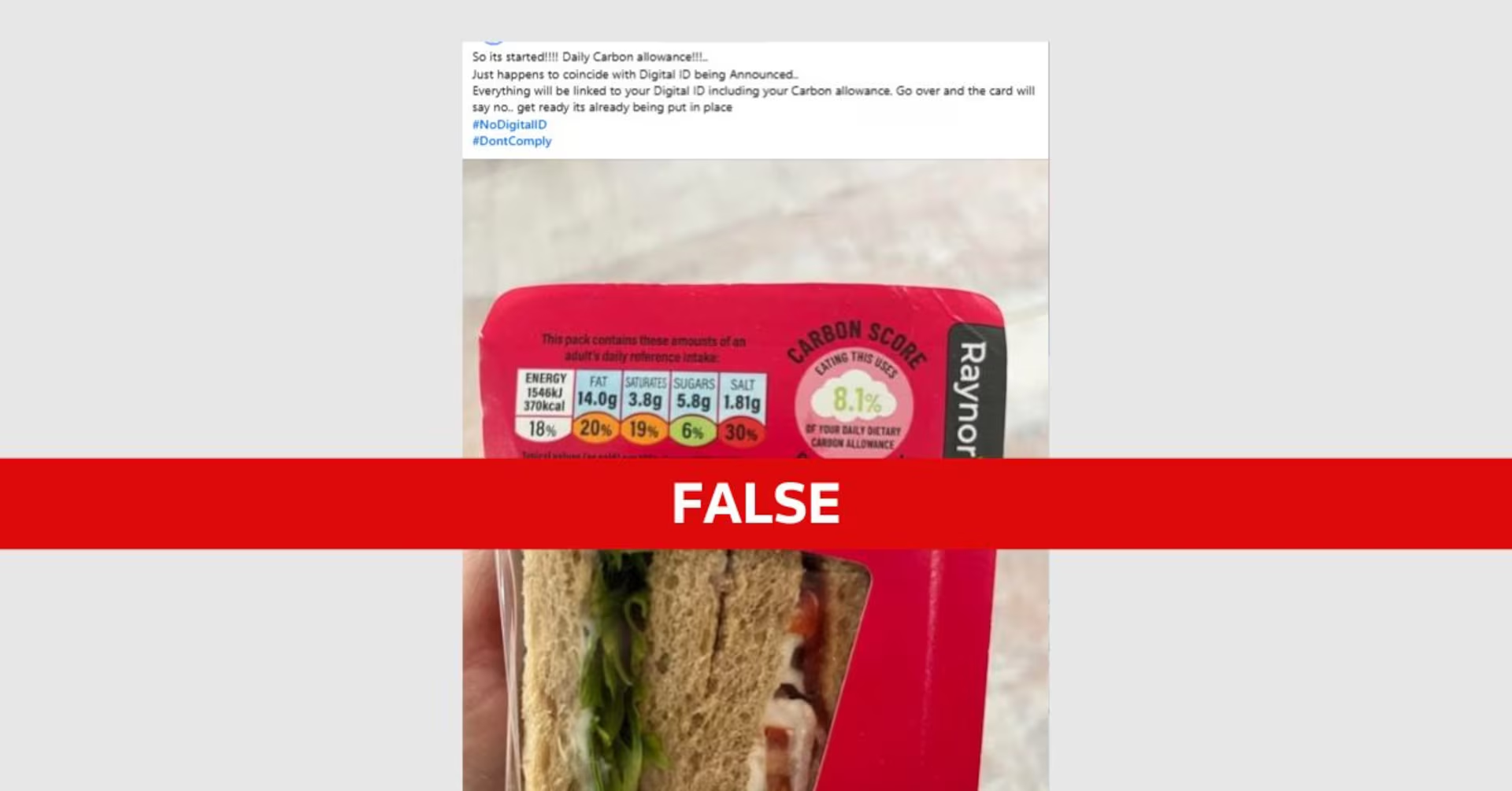Listen to the article
The UK government has firmly rejected viral social media claims that its planned digital ID system will be used to track citizens’ carbon footprints, describing such allegations as “completely nonsense and demonstrably false.”
The controversy emerged in mid-October when social media users began sharing images of sandwich packaging displaying carbon footprint information. One Facebook post claimed, “So its started!!!! Daily Carbon allowance!!! Just happens to coincide with Digital ID being announced. Everything will be linked to your Digital ID including your Carbon allowance. Go over and the card will say no… get ready its already being put in place.”
The sandwich packaging in question features a circular graphic indicating that consuming the product would use 8.1% of an individual’s daily dietary carbon allowance. However, government officials have clarified that this labeling has no connection to the digital ID initiative announced by Prime Minister Keir Starmer in September.
A spokesperson for the Department for Science, Innovation and Technology addressed the claims directly, stating that the digital ID “will be required for Right to Work checks so we can tackle illegal working – not track an individual’s carbon score.”
Furthermore, the Department for Environment, Food & Rural Affairs confirmed there is no government mandate requiring carbon scores on food products. The spokesperson explained that some manufacturers have voluntarily adopted eco-labels to help consumers make more environmentally conscious purchasing decisions.
Raynor Foods, the company that manufactured the sandwich in the viral image, has been particularly proactive in environmental transparency. According to a company spokesperson, they began placing carbon scores on their sandwich packaging in the first half of 2024, more than a year before the UK government’s digital ID announcement. The company described their decision as “completely voluntary” and noted that they had taken initial steps to calculate and publish carbon footprint information for their products as early as 2009.
The spread of these misleading claims comes amid growing public concern about digital surveillance and government overreach. The UK’s digital ID program has already faced scrutiny from privacy advocates and civil liberties groups, though primarily regarding data security and potential discrimination rather than environmental monitoring.
Digital ID systems are becoming increasingly common globally, with governments implementing them to streamline administrative processes and reduce fraud. However, their introduction often triggers public anxiety about expanded governmental powers and potential misuse of personal data.
Environmental labeling on consumer products represents a separate trend that has gained momentum as companies respond to growing consumer interest in sustainable purchasing. Many businesses voluntarily adopt carbon footprint labels and other environmental metrics to appeal to eco-conscious consumers and demonstrate corporate responsibility.
Climate policy experts note that while carbon allowances have been theoretically discussed as a potential policy mechanism for reducing emissions at individual levels, no such mandatory system exists or has been proposed by the UK government.
The misleading connection between digital IDs and carbon tracking appears to be part of a broader pattern of misinformation surrounding climate policy and digital governance. Fact-checkers have identified similar false narratives in multiple countries as governments pursue digital transformation initiatives.
The UK government continues to develop its digital ID framework, which it maintains is focused on streamlining identity verification for employment, reducing bureaucracy, and preventing illegal working – not monitoring citizens’ carbon emissions or restricting consumer choices.
Verify This Yourself
Use these professional tools to fact-check and investigate claims independently
Reverse Image Search
Check if this image has been used elsewhere or in different contexts
Ask Our AI About This Claim
Get instant answers with web-powered AI analysis
Related Fact-Checks
See what other fact-checkers have said about similar claims
Want More Verification Tools?
Access our full suite of professional disinformation monitoring and investigation tools




9 Comments
I’m glad the government has directly refuted the claims about using digital IDs to track carbon usage. However, the public’s skepticism is understandable given the potential implications of such technology.
The government’s denial of the carbon tracking claims is reassuring, but I agree that ongoing transparency will be key to maintaining public confidence. These types of initiatives require very careful handling.
Absolutely. Balancing innovation and data usage with privacy protections is a delicate challenge for policymakers.
It’s good to see the UK government pushing back on the misinformation around their digital ID plans. While the carbon footprint labeling is a separate issue, I can understand the public’s concerns about potential overreach.
Seems like the UK government is trying to get ahead of misinformation around their digital ID plans. While the carbon labeling is a separate issue, it’s understandable why people are making connections and wanting more details.
You raise a fair point. Transparency and public trust will be crucial as these digital ID systems are rolled out.
I appreciate the government clarifying that the digital ID is intended for employment checks, not carbon tracking. However, the public deserves robust safeguards to prevent mission creep or misuse of these systems down the line.
Interesting that the UK government is denying these claims about their digital ID system. I wonder if there’s more to the story than they’re letting on. Transparency around these types of initiatives is important.
The carbon footprint labeling on food packaging is an intriguing development, but it does seem unrelated to the digital ID program. Still, it raises questions about how personal data and environmental metrics could be used in the future.